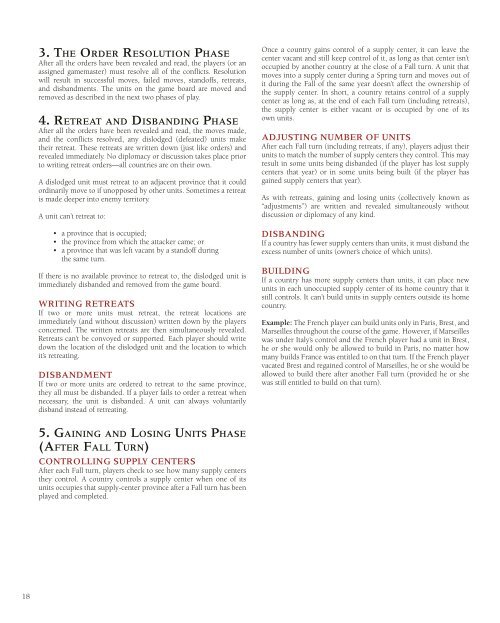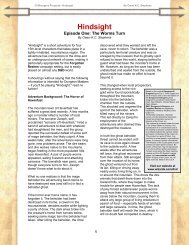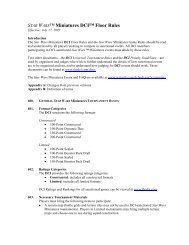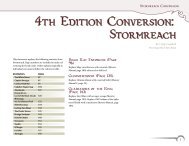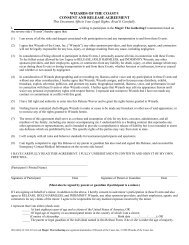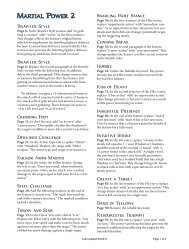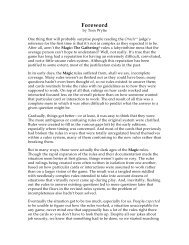Diplomacy Rulebook - Wizards of the Coast
Diplomacy Rulebook - Wizards of the Coast
Diplomacy Rulebook - Wizards of the Coast
You also want an ePaper? Increase the reach of your titles
YUMPU automatically turns print PDFs into web optimized ePapers that Google loves.
3. THE ORDER RESOLUTION PHASE<br />
After all <strong>the</strong> orders have been revealed and read, <strong>the</strong> players (or an<br />
assigned gamemaster) must resolve all <strong>of</strong> <strong>the</strong> conflicts. Resolution<br />
will result in successful moves, failed moves, stand<strong>of</strong>fs, retreats,<br />
and disbandments. The units on <strong>the</strong> game board are moved and<br />
removed as described in <strong>the</strong> next two phases <strong>of</strong> play.<br />
4. RETREAT AND DISBANDING PHASE<br />
After all <strong>the</strong> orders have been revealed and read, <strong>the</strong> moves made,<br />
and <strong>the</strong> conflicts resolved, any dislodged (defeated) units make<br />
<strong>the</strong>ir retreat. These retreats are written down (just like orders) and<br />
revealed immediately. No diplomacy or discussion takes place prior<br />
to writing retreat orders—all countries are on <strong>the</strong>ir own.<br />
A dislodged unit must retreat to an adjacent province that it could<br />
ordinarily move to if unopposed by o<strong>the</strong>r units. Sometimes a retreat<br />
is made deeper into enemy territory.<br />
A unit can’t retreat to:<br />
• a province that is occupied;<br />
• <strong>the</strong> province from which <strong>the</strong> attacker came; or<br />
• a province that was left vacant by a stand<strong>of</strong>f during<br />
<strong>the</strong> same turn.<br />
If <strong>the</strong>re is no available province to retreat to, <strong>the</strong> dislodged unit is<br />
immediately disbanded and removed from <strong>the</strong> game board.<br />
WRITING RETREATS<br />
If two or more units must retreat, <strong>the</strong> retreat locations are<br />
immediately (and without discussion) written down by <strong>the</strong> players<br />
concerned. The written retreats are <strong>the</strong>n simultaneously revealed.<br />
Retreats can’t be convoyed or supported. Each player should write<br />
down <strong>the</strong> location <strong>of</strong> <strong>the</strong> dislodged unit and <strong>the</strong> location to which<br />
it’s retreating.<br />
DISBANDMENT<br />
If two or more units are ordered to retreat to <strong>the</strong> same province,<br />
<strong>the</strong>y all must be disbanded. If a player fails to order a retreat when<br />
necessary, <strong>the</strong> unit is disbanded. A unit can always voluntarily<br />
disband instead <strong>of</strong> retreating.<br />
Once a country gains control <strong>of</strong> a supply center, it can leave <strong>the</strong><br />
center vacant and still keep control <strong>of</strong> it, as long as that center isn’t<br />
occupied by ano<strong>the</strong>r country at <strong>the</strong> close <strong>of</strong> a Fall turn. A unit that<br />
moves into a supply center during a Spring turn and moves out <strong>of</strong><br />
it during <strong>the</strong> Fall <strong>of</strong> <strong>the</strong> same year doesn’t affect <strong>the</strong> ownership <strong>of</strong><br />
<strong>the</strong> supply center. In short, a country retains control <strong>of</strong> a supply<br />
center as long as, at <strong>the</strong> end <strong>of</strong> each Fall turn (including retreats),<br />
<strong>the</strong> supply center is ei<strong>the</strong>r vacant or is occupied by one <strong>of</strong> its<br />
own units.<br />
ADJUSTING NUMBER OF UNITS<br />
After each Fall turn (including retreats, if any), players adjust <strong>the</strong>ir<br />
units to match <strong>the</strong> number <strong>of</strong> supply centers <strong>the</strong>y control. This may<br />
result in some units being disbanded (if <strong>the</strong> player has lost supply<br />
centers that year) or in some units being built (if <strong>the</strong> player has<br />
gained supply centers that year).<br />
As with retreats, gaining and losing units (collectively known as<br />
“adjustments”) are written and revealed simultaneously without<br />
discussion or diplomacy <strong>of</strong> any kind.<br />
DISBANDING<br />
If a country has fewer supply centers than units, it must disband <strong>the</strong><br />
excess number <strong>of</strong> units (owner’s choice <strong>of</strong> which units).<br />
BUILDING<br />
If a country has more supply centers than units, it can place new<br />
units in each unoccupied supply center <strong>of</strong> its home country that it<br />
still controls. It can’t build units in supply centers outside its home<br />
country.<br />
Example: The French player can build units only in Paris, Brest, and<br />
Marseilles throughout <strong>the</strong> course <strong>of</strong> <strong>the</strong> game. However, if Marseilles<br />
was under Italy’s control and <strong>the</strong> French player had a unit in Brest,<br />
he or she would only be allowed to build in Paris, no matter how<br />
many builds France was entitled to on that turn. If <strong>the</strong> French player<br />
vacated Brest and regained control <strong>of</strong> Marseilles, he or she would be<br />
allowed to build <strong>the</strong>re after ano<strong>the</strong>r Fall turn (provided he or she<br />
was still entitled to build on that turn).<br />
5. GAINING AND LOSING UNITS PHASE<br />
(AFTER FALL TURN)<br />
CONTROLLING SUPPLY CENTERS<br />
After each Fall turn, players check to see how many supply centers<br />
<strong>the</strong>y control. A country controls a supply center when one <strong>of</strong> its<br />
units occupies that supply-center province after a Fall turn has been<br />
played and completed.<br />
18


